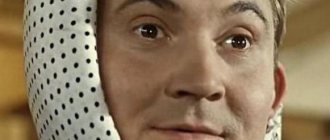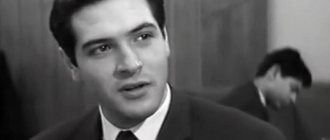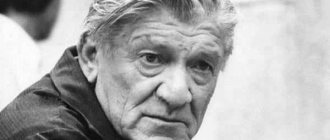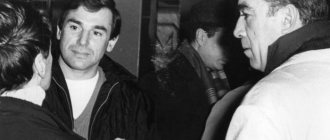Actor Evgeny Lebedev. Celebrity biography
It must be said that talented and good people cannot be forgotten, one of them is the “man with a sad face.” This is what many fans and colleagues called Lebedev.
Actor Evgeny Lebedev was born on January 15, 1917 in Balakovo. We can say about him that he was a Soviet and Russian actor, not only of theater, but also of cinema, and also a very talented and good teacher. Lebedev was born into the family of a priest, and it is worth saying that in the future he had to constantly hide his origin. The man remained with good memories of his beloved hometown forever, despite the fact that he lived there for only a short time. After many years, actor Evgeny Lebedev recalled with special tenderness and love the time when he lived in Balakovo.
Already in the 1920s, Lebedev’s family left for Kuznetsk, and then for a long time moved from place to place along the entire Saratov coast.
LEBEDEV Evgeniy Alekseevich01/15/1917, Balakovo, Saratov region - 06/09/1997, St. Petersburg
People's Artist of the USSR (1968) Hero of Socialist Labor (1987) Laureate of the Stalin Prize (1950, for the role of Stalin in the play "From the Spark...") Laureate of the USSR State Prize (1968, for theatrical work) Laureate of the State Prize of the RSFSR. Vasilyev brothers (1980, for the role of Korolev in the film “Blockade”) Laureate of the Golden Nymph Prize at the International Festival in Monte Carlo (for the role of Korolev in the film “Blockade”) Laureate of the Lenin Prize of the USSR (1986, for theatrical work)
Popov's son
Evgeny Lebedev was born on January 2 (15th according to the new style) in 1917 in the city of Balakovo, Saratov province, into the family of a priest. The family had to move around the country a lot, after which Evgeniy was sent to his grandfather in Samara in 1927.
In those years, being the son of a priest was very dangerous, and Eugene had to carefully hide his origin. He entered the college and became a Komsomol member. Evgeniy Alekseevich said: “As a Komsomol member, the provincial committee sent me to the village during the period of collectivization to work with young people. And I worked, I believed that my work was necessary. Semi-literate himself, he taught the illiterate. And how many there were at that time! Learning to write your last name is already a victory, they put it in the box for him – literate.”
In 1932, Evgeny Lebedev entered the Samara Theater of Working Youth (TRAM), but did not work there for long. A year later, its origin was revealed. Evgeniy was called to a meeting. What he had to go through! He recalled: “I’m standing in the rehearsal hall, my former comrades are around me. Now I am not their comrade, but a malicious enemy. I was pilloried. They shouted and put all sorts of labels on them. They stated that people like me had no place in the theater, and not only in the theater, but also in society... I stood and cried, I was sixteen years old...”
Evgeniy actually had to flee from Samara. In 1933, he came to Moscow and entered the studio at the Red Army Theater, and three years later he was accepted into the Central College of Theater Arts (TSETETIS, the future GITIS).
TSETETIS Lebedev graduated in 1937 - the same year when his father was repressed. A little later, Evgeniy’s mother suffered the same fate. She and her sister were left alone. Evgeniy Alekseevich said: “I brought my sister to Dzerzhinsky Square in Moscow and said: “Here is a girl, she needs to be placed in an orphanage, her parents have been repressed.” I pretended that she was a stranger to me: “I found her on the street!”... Before Lubyanka we were in the People's Commissariat for Education. The People's Commissariat for Education responded: “We don’t make enemies; whoever needs it will take care of them. Go away! And we left. We came to the women's department. After my explanation, the chairman shouted: “Ah, priestly degenerates! Did they come to us? Nowhere to go? Did you travel, ride on our neck? Enough!" We stood and listened to how adult mothers and aunts mocked us. But we hoped!..”
But life nevertheless went on. In 1937, Evgeniy entered the Chamber Theater School, where he studied with V.V. Gotovtsev, a famous actor of the Moscow Art Theater. A year later, the school was united with two other theater schools at Moscow theaters and became known as the Moscow City Theater School. In parallel with his studies, Evgeniy worked as a loader, laborer, roller, and prop maker at the Chamber Theater.
In 1940, Evgeny Lebedev graduated from college and left Moscow...
Tbilisi
Evgeny Lebedev was sent to work in Tbilisi - at the Russian Theater for Young Spectators. L.M. Kaganovich. Here he was caught by the news of the beginning of the Great Patriotic War...
In Tbilisi, Lebedev very soon became one of the leading theater actors. The roles of Mitya and Podkhalyuzin in the plays of A.N. Ostrovsky “Poverty is not a vice” and “Our own people - let us number”, Baba Yaga in the play “Vasilisa the Beautiful”, Truffaldino in “The Servant of Two Masters” by K. Goldoni, Sergei Tyulenin in “ Young Guard" and Pavel Korchagin in "How the Steel Was Tempered" made him a favorite of the local public.
In Tbilisi, Evgeny Lebedev became very close to the Tovstonogov family - Georgiy, Natella and their mother (his father was repressed in 1937). It was in those years that Lebedev’s creative union with Georgiy Tovstonogov, who taught at the Georgian Theater Institute, began to take shape. They will subsequently work together for decades.
Meanwhile, work at the Tbilisi Youth Theater became increasingly burdensome for Evgeny Lebedev. “I’ve been meaning to leave for a long time,” said Evgeny Lebedev. — Go back to Russia. And my relationship with the team was strained to the limit. They didn’t let me go... They waited for me to calm down, humble myself, get used to it. But I did not calm down, did not resign myself, I was sad, rebelled, asked to bring Russian land... They brought it to me... in a matchbox... from Moscow... I kept it in my dressing room. And I waited and waited until I could leave, to walk, to breathe, to step with my own feet on my native land. But here... everything is foreign to me... not native... They didn’t let me go.” And yet, in 1949, he finally managed to escape to Moscow.
Lenkom
In Moscow, Evgeny Lebedev worked briefly at the Industrial Cooperation Theater, after which, in the same 1949, at the invitation of Georgy Tovstonogov, who headed the Leningrad Lenin Komsomol Theater, he left for the northern capital.
Together with Georgy Tovstonogov, his sister Natella also moved to Leningrad. She was ten years younger than Evgeny Lebedev, and if in Tbilisi nothing could happen between them, here Evgeny fell in love with a matured girl. In 1950 they got married.
Natella Alexandrovna recalled: “Goga (Georgy Tovstonogov) and I were absolutely helpless people in everyday life, which cannot be said about Zhenya. Therefore, he seemed to take patronage over us. When we got married, we lived in one house. Even when we got separate apartments. Since they were located nearby, we cut a door in the wall and all lived together, as one family.”
The very first role played by Evgeny Lebedev in Lenkom brought him recognition from the official authorities. For the role of Stalin in the play “From the Spark...” he was awarded the State Prize, 1st degree. But the actor understood that this award was not at all for his abilities, but rather a tribute to the personality of Stalin himself.
Lebedev continued to hone his acting skills. Skillfully combining eccentricity and grotesquery in his work, he achieved the creation of deep psychological images. This, for example, was his Tikhon in Ostrovsky’s “The Thunderstorm”. It was this role that laid the foundation for the theme of the little man, characteristic of Lebedev’s future works. He played the Witch no less brilliantly in “The Scarlet Flower” by S.T. Aksakov.
BDT
In 1956, Georgy Aleksandrovich Tovstonogov headed the Leningrad Academic Bolshoi Drama Theater named after M. Gorky. Subsequently, after the death of Georgy Alexandrovich, the theater will be renamed the BDT named after Tovstonogov.
Following Tovstonogov, Evgeny Lebedev also left for the BDT. Lebedev's first role on his stage was Mademoiselle Kuku in the play “The Nameless Star” - a brilliant comedic and grotesque sketch.
Lebedev worked on the stage of the BDT until the end of his life, creating many unforgettable images that were included in the golden fund of the national theater. First of all, these are characters from the works of Russian classics. Among them: Rogozhin and Foma Opiskin from the plays “The Idiot” and “Foma”, staged based on the works of F.M. Dostoevsky (whom Lebedev loved very much), Serebryakov and Firs (“Uncle Vanya” and “The Cherry Orchard” by A.P. Chekhov), Krutitsky (“Simplicity is Enough for Every Wise Man” by A.N. Ostrovsky), Bessemenov (“Bourgeois” M Gorky). One of the actor’s best roles is Kholstomer in “The Story of a Horse” by L.N. Tolstoy.
In addition to Russian classics, the actor also turned to foreign ones: Falstaff in the play “King Henry IV” by William Shakespeare and Arturo Ui in the play “The Career of Arturo Ui, which Might Not Have Happened” based on Bertolt Brecht, as well as to Soviet drama: Shchukar in “Virgin Soil Upturned” according to M. Sholokhov, Aristarkh Petrovich (“Energetic People” by V. Shukshin), etc.
Evgeniy Alekseevich loved the theater with all his soul. According to Natella Alexandrovna, his work on images did not stop either after rehearsals or after performances. That’s why the characters he played on the BDT stage were always distinguished by their careful portrayal.
According to critics: “In trying to determine the role of an actor, he could be called a “neurasthenic”, a kind of researcher of the “physiology” of the Russian national character, if, according to the critic A. Svobodin, the amplitude of genre fluctuations in his stage creations was not so great.”
And here’s how critic Elga Lyndina characterizes him: “Lebedev had the gift, literally before the eyes of the audience, of creating the inner world of his heroes - reverent, contradictory, flowing from one state to another. <…> The actor knew how to surprise with his cunning and crazy prowess, to stun with effect, with an explosion of emotions, which was exactly what the audience was led to.”
Unfortunately, Lebedev was not able to play everything he wanted on stage. His dream was to play Shakespeare's King Lear. He was called to play Lear in other theaters, but in those years it was not customary to play in foreign troupes, and, besides, Lebedev knew that Tovstonogov would probably be upset by such “betrayal”. Nevertheless, he prepared for this role all his life, worked on it as if it were a premiere, knowing that he would never play it. Maybe this would be his best role on stage. Did not work out…
Film work
Evgeny Lebedev made his debut on screen already in adulthood. He turned 35 when he played a small role in the biopic Rimsky-Korsakov by Grigory Roshal and Gennady Kazansky. And then there was his unforgettable Romashov (Romashka) in the film adaptation of Kaverin’s novel “Two Captains” (later this role would be played no less brilliantly by Yuri Bogatyrev).
Unlike the theater, cinema was in no hurry to take advantage of the actor’s multifaceted talent. Although Lebedev acted a lot, but, as a rule, in supporting roles. At the same time, the actor’s virtuoso skill was so great that he often put his characters on a par with the main ones. It is worth remembering Spuzhov from Iskander Khamraev’s film story “Mercy Train”, Agafon Dubtsov from “Virgin Soil Upturned”, filmed by Alexander Ivanov based on the famous novel by Sholokhov, the colonel in Gleb Panfilov’s war film “There is No Ford in Fire”, Nechipor in the sparkling comedy “Wedding in Malinovka” and etc.
When Lebedev had a rare chance to play the main role, then he unfolded in his full glory. In Leonid Derbenev’s lyrical drama “The Last Month of Autumn”, with great tenderness and lyricism, he played the role of a Father who decided to visit his sons, from whom there has been no news for a long time. The role of Bronka Pupkov in the short story “Fatal Shot” (film almanac “Strange People”), directed by Vasily Shukshin, also turned out to be very striking.
Among the best images created by Evgeny Lebedev on the screen: Boris Savinkov in the historical adventure series by Mark Orlov “Syndicate-2” based on the novel by V. Ardamatsky “Retribution” and Korolev in the epic film “Blockade” by Mikhail Ershov (Vasiliev Brothers Prize).
Last years
Evgeny Lebedev suffered a severe stroke, accompanied by loss of speech. It seemed that the theater was out of the question, because he had to relearn how to move, walk, and talk. But he found the strength to return to the stage, and after that he also played Kholstomer and Professor Serebryakov, performed in L. Dodin’s plays at the MDT: “Love under the Elms” (Efraim Cabbot) and “The Cherry Orchard” (Firs).
Natella Alexandrovna recalled: “But his character changed a lot after his illness. Before that, he was very cheerful and easy to talk to. The illness made his character more difficult. It is very difficult for me to come to terms with his departure. Evgeniy Alekseevich’s death might not have happened, he was a very strong man, even in his eighties... If he had not been persuaded to undergo an operation that was absolutely unnecessary for him, which, moreover, they failed to perform, he would still be playing in the theater now...”
Evgeniy Alekseevich died on June 9, 1997 in St. Petersburg.
Igor BIN
Materials used: Evgeny Alekseevich Lebedev https://www.krugosvet.ru; Elga Lyndina. Evgeny Alekseevich Lebedev. Short biography. Encyclopedia of Cinema Cyril and Methodius 2000; Natela Tovstonogova, “The Great Actor” (“AiF Long-Liver” No. 23 (59) dated 12/09/04)
Moving to Moscow
In 1927, actor Evgeny Lebedev moved to Samara to live with his grandfather, who raised him. There, in Samara, he began to study at secondary school No. 13 named after. Chapaeva. After that, Zhenya studied at the FZU at. Already in 1932, Lebedev entered TRAM. The next year, the actor left Samara and moved to Moscow. There he had to work in a studio at the Red Army Theater. In 1936 he entered and until 1937 studied at the technical school, which is now called GITIS. And in 1940, Lebedev graduated from the Chamber Theater School, where he studied since 1937.
In 1937, Evgeniy’s father was repressed, and after some time, so was his mother. For many years, he had to hide from everyone the fact that he was the son of “enemies of the people,” and it is worth saying that the actor was always very ashamed of this.
Childhood and youth
The actor was born into the family of a priest who lived and served in the city of Balakovo, Saratov region. Such a relationship did not paint Lebedev’s biography, so it was necessary to hide the origin for many years. The Soviet state machine did not spare my father; in 1937 the man was repressed, and soon my mother went to the camps. The actor turned into the son of enemies of the people. After the war, my father was shot.
Video course “Spring”
Landscaping for busy people, a beautiful garden without the hassle
A training course for those who want to make their dacha beautiful and prefer to spend their time, effort and money wisely.
Special offer! 50% discount! Make good use of your self-isolation!
₽ 1200.00 ₽ 600.00
MORE ❯❯❯
Evgeny Lebedev in childhood with his parents
From the age of 10, Zhenya was raised by his grandfather, with whom the boy moved to Samara, and from the age of 12 he was already working. At the same time, he first studied at school No. 13, named after Vasily Chapaev, then entered a factory educational institution organized at the base. It was here that the young man realized where his soul lay - he became an activist in amateur performances. As a result, he joined the ranks of the studio opened in the Samara Theater of Working Youth.
In the future, the already established actor will tell fans in his stories what difficulties he had to face. Zhenya hid his origins from those around him; according to legend, his parents died in 1921 from hunger on the Volga. The young man organized a Komsomol cell, and during the period of collectivization he worked on instructions from the provincial committee in villages with young people.
Evgeny Lebedev in his youth
But one day the truth emerged, yesterday’s friends and comrades shamed the 16-year-old Komsomol member to tears, who suddenly turned out to be the priest’s son and buried his parents ahead of time. I had to lie even after my father was shot. Evgeniy remained the eldest in a family where four more children were growing up. He sent his younger sister to an orphanage, pretending that he did not know the girl. These events are also reflected in the man’s memoirs.
In 1933, the aspiring actor went to the capital of Russia, where he was warmly received at the Red Army Theater. A little later he studied at what is now GITIS and the Chamber Theater School. He earned his bread wherever he could.
Evgeny Lebedev as Baba Yaga
He worked as a laborer at an oil factory, tried his hand at construction, and even worked at the Red October confectionery factory as a roller. There was still not enough money, sometimes we had to spend the night on the street.
Subsequently, Evgeniy Alekseevich was tossed around the Union. The talented Saratov resident was assigned to the Tbilisi theater troupe, where he rose to the rank of leading actor. The repertoire was filled with bright roles from the plays of Alexander Ostrovsky, Denis Fonvizin and other classics of Russian literature. Lebedev even played Baba Yaga
. The actor returned to Moscow again, and from there he moved to Leningrad, where he settled permanently.
Work in Tbilisi
Lebedev is an actor who became popular just a few years after working in the theater and playing his first roles in 1940. Then in Tbilisi he began working in the Youth Theater, and it was after this that he began to be considered a leading actor.
It must be said that Evgeniy was not only an actor, but also a teacher. In Tbilisi, Lebedev combined work in the theater for young spectators with teaching acting at the Georgian Theater Institute. It is important that the actor was also the head of the drama club at girls’ school No. 16.
Lebedev is an actor who in 1945 was awarded the medal “For the Defense of the Caucasus.” In 1946, he was awarded the medal “For Valiant Labor in the Great Patriotic War.” Evgeniy received these medals because, together with a group of artists from his theater, he performed in military units, hospitals, and also in factories with patron concerts.
Titles and awards
- Hero of Socialist Labor (1987)
- Honored Artist of the RSFSR (1953)
- People's Artist of the RSFSR (1962)
- People's Artist of the USSR (1968)
- Lenin Prize (1986) - for theatrical works of recent years
- Stalin Prize, first degree (1950) - for playing the role of I.V. Stalin
in the play “From the Spark...” by Sh. N. Dadiani - State Prize of the USSR (1968) - for playing the role of Vasily Vasilyevich Bessemenov
in the play “The Bourgeois” by M. Gorky at the Bolshoi Drama Theater. M. Gorky - State Prize of the RSFSR named after the Vasilyev brothers (1980) - for his performance as Korolev
in the film “Blockade” (1973, 1977)[4] - Two Orders of Lenin (1971, 1987)
- Order of the Red Banner of Labor (1977)
- Order of Merit for the Fatherland, III degree (1997) - for great contribution to the development of theatrical art
[12] - Medal "For the Defense of the Caucasus" (1945)
- Medal "For Valiant Labor in the Great Patriotic War of 1941-1945" (1946)
- Medal "In memory of the 250th anniversary of Leningrad" (1957)
- Medal "Veteran of Labor" (1984)
- Badge "For services to Polish culture" (1979)
- Prize of the KGB of the USSR in the field of literature and art, 1st degree (1984, for participation in the film “Syndicate-2”, the role of the terrorist B. Savinkov
) - Prize of the Mayor of St. Petersburg A. A. Sobchak “For outstanding services in the development of culture” (1994)
- Mar del Plata Film Festival (Best Actor Award, 1966, Argentina, “The Last Month of Autumn”)
- Television Festival in Monte Carlo (Golden Nymph Prize, 1977, for participation in the film “Blockade”)[4]
- The highest theater award of St. Petersburg “Golden Sofit” is a special award “For creative longevity and unique contribution to theatrical culture” (1996)[4].
- Honorary citizen of Balakovo (1987)[5]
- Honorary citizen of Tbilisi (1992)[5]
- Honorary citizen of St. Petersburg (1996)[4].
Lenkom
Lebedev began working at the Leningrad Komsomol Theater, where he was invited by the director G. Tovstonogov. Evgeniy had to work with him while still in Tbilisi. He remembered his first role for a long time. Lebedev played Sanya Grigoriev in the film “Two Captains”. In 1950, the actor received the Stalin Prize, 1st degree, for playing Stalin in the play of the theater director. This was Lebedev's second role. When Evgeniy worked at the Leningrad Theater, he received the title “Honored Artist of the RSFSR.”
Movies
The actor’s filmography is impressive - Evgeniy Alekseevich took part in more than 90 film projects. He first appeared on screen in adulthood. In 1952, the theater artist was invited to play the modest role of Koshchei the Immortal in the biographical film Rimsky-Korsakov, directed by Grigory Roshal and Gennady Kazansky.
Evgeny Lebedev in the film “Two Captains”
And three years later, the unforgettable Romashov appeared - a character in the film adaptation of Veniamin Kaverin’s work “Two Captains”. At the same time, Lebedev starred with Friedrich Ermler in “The Unfinished Tale.” She got the role of the secretary of the district committee, Fyodor Ivanovich, and her colleagues on the set were the stars of the Soviet screen - Elina Bystritskaya, Sergei Bondarchuk, Evgeny Samoilov.
Life in the theater was very different from working in cinema. For a long time, directors could not discover the versatility of the actor’s talent and therefore were in no hurry to offer the main roles in films. However, the man managed to masterfully turn the secondary characters almost into leading ones. This is proven by a scattering of ribbons.
Evgeny Lebedev in the film “Virgin Soil Upturned”
Evgeny Alekseevich brilliantly portrayed Agafon Dubtsov in the drama based on the novel by Mikhail Sholokhov “Virgin Soil Upturned”, as Spuzhov in the war film “Mercy Train”, based on the story by Vera Panova.
The audience will forever remember Lebedev’s performance in Gleb Panfilov’s film “There is No Ford in Fire,” where he tried on the image of a colonel, and in the sparkling comedy “Wedding in Malinovka,” in which he appeared in the guise of grandfather Nechipor.
Evgeny Lebedev in the film “Wedding in Malinovka”
Rarely did Evgeny Lebedev get the chance to play the main role, but if this happened, the actor was at his best. Just look at the image of a father who goes to visit his sons in the lyrical drama “The Last Month of Autumn.” Evgeniy Alekseevich played the role with piercing tenderness.
Evgeny Lebedev in the film "Blockade"
Bronka Pupkov from the film novel “Strange People”, directed by Vasily Shukshin, turned out to be memorable and bright. And the role of Mikhail Ershov in the military epic “Blockade” was appreciated at the highest level, awarding Lebedev the State Prize of the RSFSR. Vasiliev brothers.
Evgeniy Alekseevich’s last film was the comedy “Whom God Will Send,” which was presented in 1994 by director Vladimir Zaikin. The main roles in the film are played by Larisa Udovichenko and Stanislav Sadalsky.
The theater where the actor worked until the end of his life
Lebedev Evgeniy Alekseevich is an actor who worked at the Gorky Drama Theater from 1956 until the very end of his life. Here his first role was the role of Mademoiselle Kuku. It was a comic sketch, because of which the actor's career took off. He played the role brilliantly and was able to give the viewer a sea of positive emotions and smiles.
The role of Romashov in the film “Two Captains” made Lebedev famous throughout the country. Many spectators began to recognize him, and absolutely everyone loved his acting and skill. After this, for the first time after moving and the last time in his life, Evgeniy visited his native and beloved Balakovo.
What the “great actor” Evgeny Lebedev was hiding.
"Kholstomer"! Brilliant work!!!
Just keep in mind that this is a late recording from 1989. It was staged by Tovstonogov in 1975.
I have never seen anything on stage stronger than this... CT
"The Story of a Horse." Indeed, it was something extraordinary.
I remember this performance as if I had seen it recently.
The audience watched with bated breath.
January 15 marks the 100th anniversary of the birth of Evgeny Lebedev, a Soviet theater and film actor who was called the “great actor” of the 20th century.
The name Evgeny Lebedev is well known to the older generation. His roles in films
“Two Captains”, “Virgin Soil Upturned”, “I’m Going into a Storm”, “Wedding in Malinovka”, “Blockade” are remembered by many, but this is only a small part of the acting works of a talented artist who went on stage to play until he was 80 years old. The dramatic actor faced many trials, and on Lebedev’s anniversary I would like to remember only a few of them.
"Popov's son"
People's Artist of the USSR, Hero of Socialist Labor, laureate of the Lenin Prize, Stalin Prize of the first degree and the State Prize of the USSR was born in the city of Balakovo in the family of a clergyman. And, unfortunately, the first serious lesson that the talented young man had to learn: he must hide his origin.
Evgeny Lebedev. 1987
Wherever a Komsomol member appeared, he was bullied, called “the priest’s son.” Paying for his “pedigree,” Lebedev was forced to change several theater schools, move from city to city, work as a loader, laborer, roller, prop maker and... learn to lie. Lebedev said that his parents died in the hungry year of 1921, and he secretly met with his mother. “Since I started lying, they began to treat me well, they stopped calling me “bastard” and “reveler”. But the fear of God followed me all the time and reminded me of my sins until I got used to it, because the other fear became more terrible. God still doesn’t know when he will punish. And people punished quickly,” the artist later recalled.
He didn’t have to lie for long about his father’s death: in 1937, Alexei Lebedev was shot. And just a few days before, their last meeting took place in the station buffet at Arkadak station. The father is over sixty, the son is twenty. The actor remembered this meeting forever: “The first and last time I drank with my father. He himself suggested to me: “I want to have a drink with you.” I feel like we will never see each other again." I never expected to hear this from him. And he looked at the pile and said, like a spell, like a prayer: “Remember: never lose faith. Never part with her. Whatever you do, you must have faith in your work. Do your work with faith and reverence, earn a piece of bread. Do not desecrate your temple, the temple is in you, the temple is our soul. Work and you will be rewarded, knock and the doors of knowledge of life will open for you, seek and you will find... Do not offend people, for there is God in man. God is a man."
Evgeny Lebedev as Ivan in a scene from the play “Ivan”. 1986
Orphanage
There was another terrible episode in Lebedev’s biography, which he could never forget. A year after his father’s death, his mother was shot, and the young actor was left with a young sister, whom he was forbidden to take with him to the dormitory.
To accommodate the little one, the artist went with her to the People's Commissariat of Education, where they told him: “We are not making enemies. Whoever needs it will take care of them. Go away." Then he went to the women’s department, where he heard: “Ah, priest’s degenerates! Did they come to us? There is nowhere to go, we traveled, rode on our neck. Enough!" After much wandering and humiliation, Lebedev managed to place Nina in an orphanage, but to do this he had to lie that he found the girl on the street and did not even know her.
Of course, many years later the artist found his younger sister, whom in 1937, it seemed, he had left forever in an orphanage, but never recovered from his emotional wounds. “All his life he could not forgive himself for this, but there was no other way,” recalled Lebedev’s friend Oleg Basilashvili. Also, his stage colleague was right when he said: “He put all his pain for his relatives, for their crossed out, distorted destinies, into his roles. One might say that the tragedy of life created him as an actor and left its mark on all his work.”
Evgeny Lebedev as Kholstomer in the dramatic musical “The Story of a Horse” based on the story “Kholstomer” by L. Tolstoy. 1978
Unplayed role
Perhaps the most “heavy” part of the talented artist’s career was the play “The Story of a Horse,” in which he played the main role. In the story of his hero - an old piebald gelding - there was a lot from the life of Lebedev himself. The actor said: “I play a horse. Before I say the first phrase, I always remember my father and mother, and only then I say: “When I was born...”.” And the audience claimed that anyone who had ever seen “The Story of a Horse” in the Bolshoi Drama Theater could never forget this artist: there was so much pain in him.
Once, critic Elga Lyndina described Lebedev: “He had the gift, literally before the eyes of the audience, of creating the inner world of his heroes: reverent, contradictory, flowing from one state to another. The actor knew how to surprise with slyness and crazy prowess, to stun with effect, with an explosion of emotions, which the audience was definitely led to see.” And when, at the age of 35, the artist made his debut on the big screen, the general public was already able to see his talent.
By the age of 80, Lebedev had dozens of theater and film roles in his treasury, but, unfortunately, he was never able to play everything he wanted on stage. The artist's main dream was the role of Shakespeare's King Lear. Lebedev was even offered to play it in several theaters, but he refused, since at that time he served in the Bolshoi Drama Theater, where the main director was Georgy Tovstonogov, his close friend and brother-in-law. The artist did not want to “betray” his comrade (at that time it was not customary to play in other people’s troupes). Lebedev’s wife, Natela Aleksandrovna Tovstonogova, recalled it this way: “Zhenya didn’t even tell him about these proposals. But all his life he dreamed of the role of King Lear. And he didn’t just dream, but worked on it, as if he were preparing for the premiere. And I know for sure that he was ready for this role. And he knew the text by heart. Although he never played it.”
Shortly before his death, Lebedev suffered a severe stroke, after which he had to relearn how to move, walk, and talk. He even returned to the theater, but at the age of 80 he left forever not only from the stage. His widow was convinced that this death might not have happened at this age: “He was a very strong man even in his eighties... If he had not been persuaded to undergo an operation that was absolutely unnecessary for him, which they had not yet been able to perform, he would now be playing in the theatre…".
Memories of childhood
After visiting his city, Lebedev again began to be visited by memories of a wonderful and carefree childhood. The actor recalled that his mother often took him to theaters when he was very young. However, Lebedev shares that he was not interested in acting at all. From early childhood, Zhenya dreamed of becoming a captain. His thoughts were filled with how he would sail on a ship, become a sailor or a fireman. Little Lebedev loved the Volga very much, and his main thing was simply to observe its beauty. Evgeniy shared that all the 30 years that he spent away from home, he had a desire to see the Volga expanses and his beloved hometown again.
Personal life of a talented actor
Actor Evgeny Lebedev devoted almost his entire adult life to the theater. The actor’s personal life did not become a secret, because he could not hide it. In 1938, he married Natalya Petrova, but it must be said that the spouses were apparently not destined to live happily ever after. A year after the wedding, Evgeny and Natalya had a daughter, whom the couple decided to name Irina. However, even a child could not keep them together.
Tovstonogov divorced, after which his ex-wife left him two children. His sister, Natela, decided that she would help her brother raise their children. At first they had to live in a dormitory, but soon they were given an apartment. It must be said that at this time Evgeny Lebedev arrived in Leningrad, who was invited by Georgy Tovstonogov. An old friend decided to help Goga and Natela, and therefore moved in with them and took patronage over their brother and sister.
From that moment on, love arose between Evgeniy and Tovstonogova and they began dating. Their wedding became happiness not only for the newlyweds themselves, but also for Georgy Tovstonogov. It must be said that the connection between brother and sister was so strong that even after Natela’s marriage they could not be separated. Their apartments were located on the same floor, after which the newlyweds and Tovstonogov decided to cut through the walls and live as a large family in one apartment. Soon Natela gave birth to a child, and now the friendly family consisted of spouses, Tovstonogov and already three boys.
Personal life
While working in the Tbilisi theater, Evgeny Lebedev became friends with director Georgy Tovstonogov, even rented a room in his apartment. He remained devoted to his friend and colleague until the end of his life. Evgeniy Alekseevich dreamed of playing King Lear
, knew the role by heart, but never received such a gift from the director. But when the actor was offered to embody this image in other theaters, he invariably refused, fearing to offend Georgy Alexandrovich.
Evgeny Lebedev and his wife Natela
The actor married Tovstonogov’s younger sister Natela, the marriage lasted a lifetime. The couple had only one child - son Alexey, who later became a film director. In his memoirs about his friend and colleague, actor Oleg Basilashvili noted that Lebedev carried through his life the guilt of leaving his little sister in an orphanage and was never able to forgive himself.
Apparently, that’s why the artist tried to pamper his own son, giving every drop of warmth and care. By the way, I finally found my sister many years later.
Evgeny Lebedev with his son Alexey
Evgeniy Alekseevich was known as a jack of all trades, he created crafts from wood, he could easily make repairs, alter clothes, catch fish, and he loved to cook.
Another pipe dream of the actor is a grandson. Lebedev died a year before the birth of a son in the family; the baby was named Evgeniy in honor of his grandfather.
Evgeny Lebedev is an actor. Filmography. Best roles
We can say that throughout his life Lebedev played a huge number of different roles, which made him a famous and respected actor. The following roles enjoyed great success:
- Rogozhin based on the novel “The Idiot”.
- Role in the play "The Bourgeois".
- Role in “The Last Month of Autumn.”
- Bronka Pupkov in “Strange People”.
- Role in "The Story of a Horse", etc.
Many fans are interested in why actor Evgeny Lebedev died, but there is still no concrete answer to this question. It is very difficult to find any information about what caused the death of the great Russian actor.
Filmography
- 1952 – “Rimsky-Korsakov”
- 1955 – “Two Captains”
- 1955 – “The Unfinished Story”
- 1961 – “Virgin Soil Upturned”
- 1964 – “Mercy Train”
- 1965 – “The Last Month of Autumn”
- 1967 – “Wedding in Malinovka”
- 1969 – “Strange People”
- 1974 – “The Last Day of Winter”
- 1974 – “Blockade”
- 1977 – “First Joys”
- 1980 – “Squadron of Flying Hussars”
- 1985 – “Farewell of the Slav”
- 1992 – “I myself am a native of Vyatka”
- 1994 – “Whom God sends”
Briefly about the life of an actor
There are a lot of good things to say about Evgeny Lebedev and absolutely nothing bad. Despite the fact that his childhood was quite difficult, he was able to become a man with a capital M, who was not angry with the whole world. In his childhood and youth, Evgeniy was often called the son of “enemies of the people” because he was born into the family of a priest. Lebedev had to hide his origin, and this is what he considered a sin. However, Eugene said: “Who knows when God will punish. People will punish you sooner."
It must be said that Evgeny Lebedev was a very talented actor who differed from many others in his skill and real talent. He was excellent at facial expressions and gestures. His performance was remembered by everyone and captivated every viewer. He was not only a talented actor, but also a kind, affectionate, sensitive and understanding person. No one can take the place of the respected and famous Evgeny Lebedev. The roles he played will forever remain in the memory of every viewer who admired the performance of the great Russian actor.
Tbilisi
The biography of actor Evgeny Lebedev indicates that he worked for some time at the Russian Theater for Young Spectators (Tbilisi). Almost immediately he became one of the leading artists. “We will count our own people”, “Poverty is not a vice”, “Vasilisa the Beautiful”, “The Servant of Two Masters”, “How the Steel Was Tempered”, “The Young Guard” - productions with his participation came out one after another. Spectators appeared who came to the theater specifically to enjoy his performance.
In Tbilisi, Lebedev quickly made friends; he developed the warmest relations with the Tovstonogov family. It was then that his creative union with Georgy Tovstonogov began; this collaboration lasted for several decades.
The biography of actor Evgeny Lebedev indicates that he quickly got tired of life in Tbilisi. He dreamed of returning to Russia, but could not quit the theater. The management did not want to part with the promising artist; he was able to escape to Moscow only in 1949.











